
Lata Mangeshkar was an Indian playback singer and occasional music composer. She is considered to be one of the greatest and most influential singers of the Indian subcontinent. Her voice was one of the unifying elements of the people of India, Pakistan, Bangladesh, and Nepal. Her contribution to the Indian music industry in a career spanning eight decades gained her honorific titles such as the "Queen of Melody", "Nightingale of India", and "Voice of the Millennium".

Waheeda Rehman is an Indian actress. Regarded as one of Hindi cinema's most accomplished actresses, she has worked in more than 90 feature films, in a career spanning over five decades. Her accolades include a National Film Award and three Filmfare Awards. She was honoured with India's civilian awards; the Padma Shri in 1972 and the Padma Bhushan in 2011. In 2021 she was honoured with the Dadasaheb Phalke Award, India's highest award in the field of cinema, but was awarded in 2023.
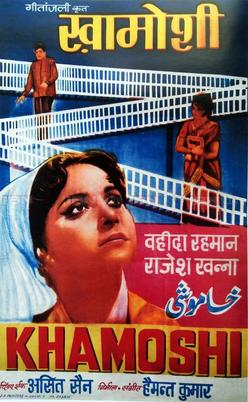
Khamoshi (transl. Silence) is a 1969 black-and-white Hindi drama film directed by Asit Sen, starring Waheeda Rehman and Rajesh Khanna. It is especially remembered for its memorable music by Hemant Kumar and lyrics by Gulzar in songs such as "Tum Pukaar Lo... Tumhara Intezaar Hai" sung by Hemant Kumar, "Woh Shaam Kuch Ajeeb Thi" by Kishore Kumar and "Humne Dekhi Hai In Aankhon Ki Mehekti Khushboo" sung by Lata Mangeshkar. Though what really made this film stand out was the B&W cinematography by Kamal Bose, who won Best Cinematographer at the 18th Filmfare Awards for his work in the film and received high critical acclaim for Rehman and Khanna's performances. Rehman's performance earned her a Best Actress nomination at the same ceremony. The film was a moderate success at the box-office.

Trishul (transl. Trident) is a 1978 Indian Hindi-language action drama film, directed by Yash Chopra, written by Salim–Javed and produced by Gulshan Rai. It features music by Mohammed Zahur Khayyam, with lyrics by Sahir Ludhianvi. The film features an ensemble cast of Shashi Kapoor, Sanjeev Kumar, Amitabh Bachchan, Hema Malini, Raakhee Gulzar, Poonam Dhillon, and Sachin, with Waheeda Rehman in a special appearance.
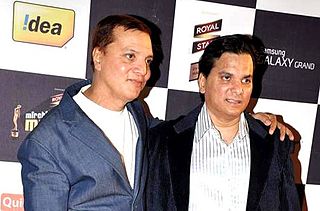
Jatin–Lalit is a renowned Indian music director duo consisting of brothers Jatin Pandit and Lalit Pandit. They are celebrated for their contribution to Bollywood music during the 1990s and early 2000s. The duo is known for their melodious compositions and has been associated with several hit films. Some of their most famous works include Dilwale Dulhania Le Jayenge, Kuch Kuch Hota Hai, Mohabbatein, Kabhi Khushi Kabhie Gham..., and Pyaar To Hona Hi Tha.

Biswajit Chatterjee, known mononymously as Biswajit, is a veteran Indian actor, producer, director, singer and politician known for his work in Bengali cinema and Hindi cinema.

Ankhen is a 1968 Hindi spy thriller produced and directed by Ramanand Sagar. The film stars Mala Sinha, Dharmendra, Mehmood, Lalita Pawar, Jeevan and Madan Puri.

Patthar Ke Sanam is a 1967 Indian Hindi-language movie. Produced by the Nadiadwalas, the film is directed by Raja Nawathe. It stars Manoj Kumar, Waheeda Rehman, Mumtaz, Pran, Mehmood, Lalita Pawar and Aruna Irani. The movie features many hit songs of the era, composed by the legendary Laxmikant Pyarelal and veteran lyricist Majrooh Sultanpuri, such as the ever-haunting Patthar Ke Sanam, rendered in the voice of Mohammad Rafi. The film stood ninth in the Box-Office Top Ten List of 1967.
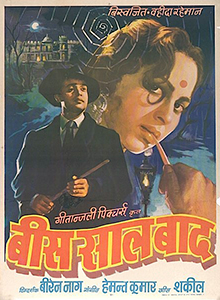
Bees Saal Baad is a 1962 Indian Hindi-language psychological thriller film. It was directed by Biren Nag and produced by Hemant Kumar, who also composed the music and sang some of the songs. The film marks the directorial debut of Biren Nag, and stars Biswajeet, Waheeda Rehman, Madan Puri, Sajjan and Asit Sen.
Bees Saal Pehle is a 1972 Bollywood drama film directed by Probir Roy. The film stars Lalita Pawar.
Ek Mutthi Aasmaan is a 1973 Bollywood drama film directed by Virender Sinha. The film stars Vijay Arora and Yogeeta Bali.
Asit Sen was an Indian film director, cinematographer, documentary Filmmaker and screenwriter, who worked in both Bengali and Hindi cinema. He was born in Dhaka, now in modern-day Bangladesh, when it was part of East Bengal in British India. He directed 17 feature films in Hindi and Bengali, and was most known for the films Deep Jweley Jai (1959) and Uttar Falguni (1963) in Bengali, Mamta (1966), Khamoshi (1969), Anokhi Raat (1968) and Safar (1970) in Hindi.
Biren Nag (1922–1964) was an acclaimed Indian film director and art director in Hindi cinema. Prior to taking up direction himself, he served as Art Director for four of the most beautiful films shot in Mumbai in the late 1950s and early 1960s: Pyaasa (1957) Kala Pani (1958) Chaudhvin Ka Chand (1960); and Sahib Bibi Aur Ghulam (1962). He won a 1960 Filmfare Award for Best Art Direction for his work on Chaudhvin Ka Chand (1960).
The 16th Filmfare Awards were held in 1969.
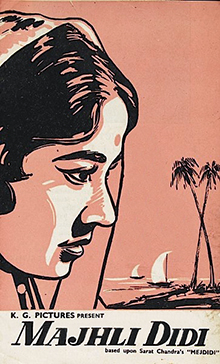
Majhli Didi is a 1967 Bollywood film directed by Hrishikesh Mukherjee, based on the Bengali language story, Mejdidi by Sarat Chandra Chattopadhyay, which was earlier filmed in Bengali in 1950 as Mejdidi. Majhli Didi stars Meena Kumari and Dharmendra.

Rakhi is a 1962 Indian Hindi-language drama film directed by A. Bhimsingh and starring Ashok Kumar, Waheeda Rehman, Pradeep Kumar and Mehmood. A major success, This film had Kumar winning the Filmfare Award for Best Actor for his performance and screenwriter K. P. Kottarakara won the Filmfare Award for Best Story. It was nominated for a Filmfare Award for Best Movie and Mehmood was nominated for the Filmfare Award for Best Supporting Actor. The film was shot at Neptune Studios in Chennai. This film was a remake of the Tamil film Pasamalar. Pasamalar was remade in Telugu as Rakta Sambandham, which went on to be remade again in Hindi as Aisa Pyaar Kahan.
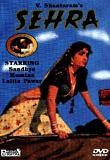
Sehra (Desert) is a 1963 Hindi romantic family drama film directed by V. Shantaram, who also wrote the screenplay. The story and dialogue writer was Shams Lucknowi. Made by Shantaram Productions, it had music composed by Ramlal with lyrics by Hasrat Jaipuri. The actress Mumtaz played a small character role in this film and also in Shantaram's earlier Stree (1961). The film starred Sandhya, Prashant, Mumtaz, Lalita Pawar, Manmohan Krishan, Ulhas, Babloo, M. Rajan and Baburao Pendharkar.
Insaf is a 1973 Bollywood film directed by Adurthi Subba Rao. It stars Waheeda Rehman, Vijay Arora, Tanuja in lead roles.

Majboor is a 1964 Indian Drama film produced by Mohan Segal and directed by Narendra Suri in Hindi language under the banner of Deluxe Films.
Kahin Deep Jale Kahin Dil is an Indian song from the Bollywood film Bees Saal Baad (1962). The lyrics of the song were written by Shakeel Badayuni, the music was composed by Hemanta Mukherjee and Lata Mangeshkar was the playback singer. In 1963, Badayuni received the Filmfare Award for Best Lyricist and Lata Mangeshkar received the Filmfare Award for Best Female Playback Singer for this song. This was Mangeshkar's second Filmfare award.













